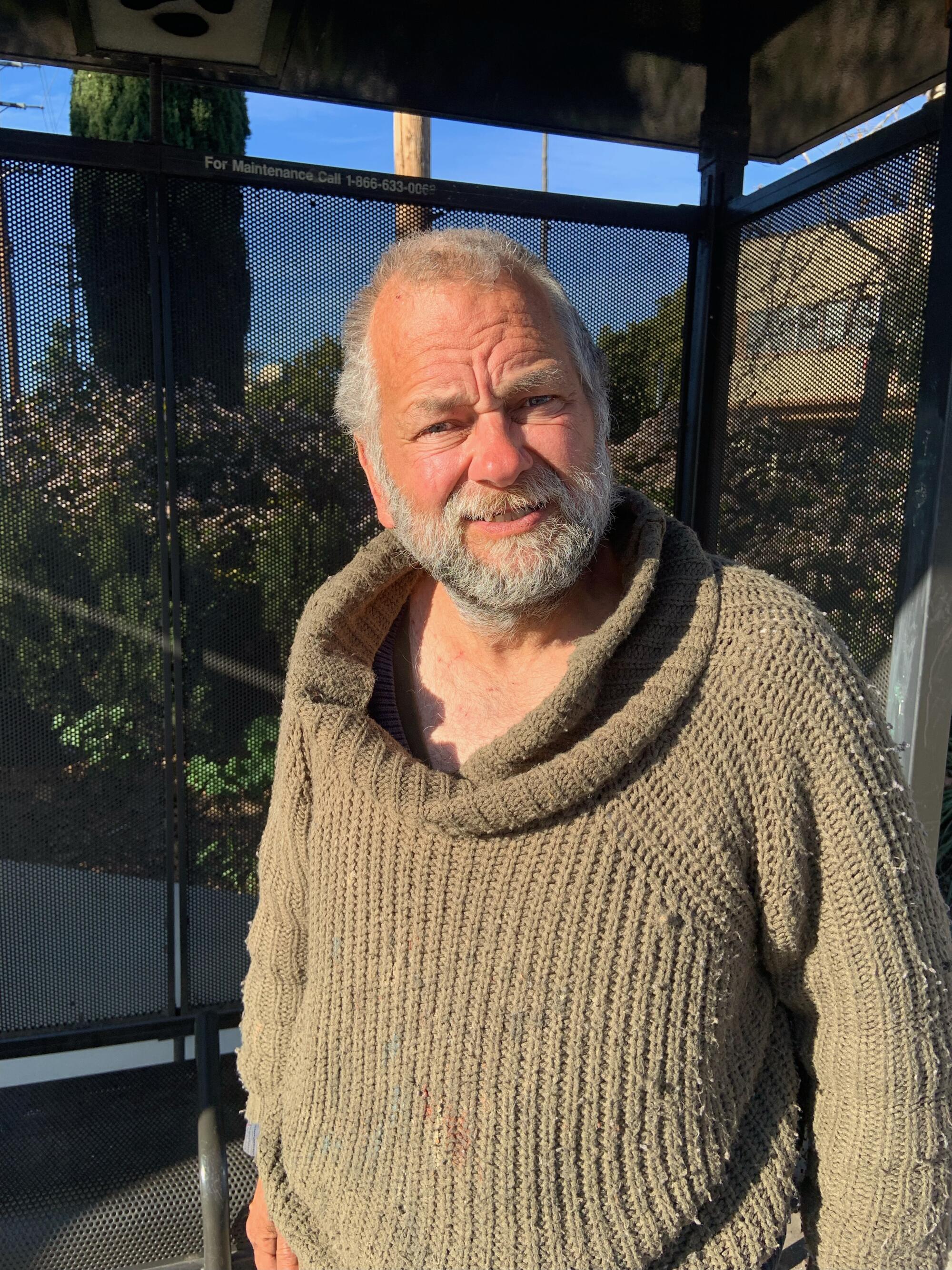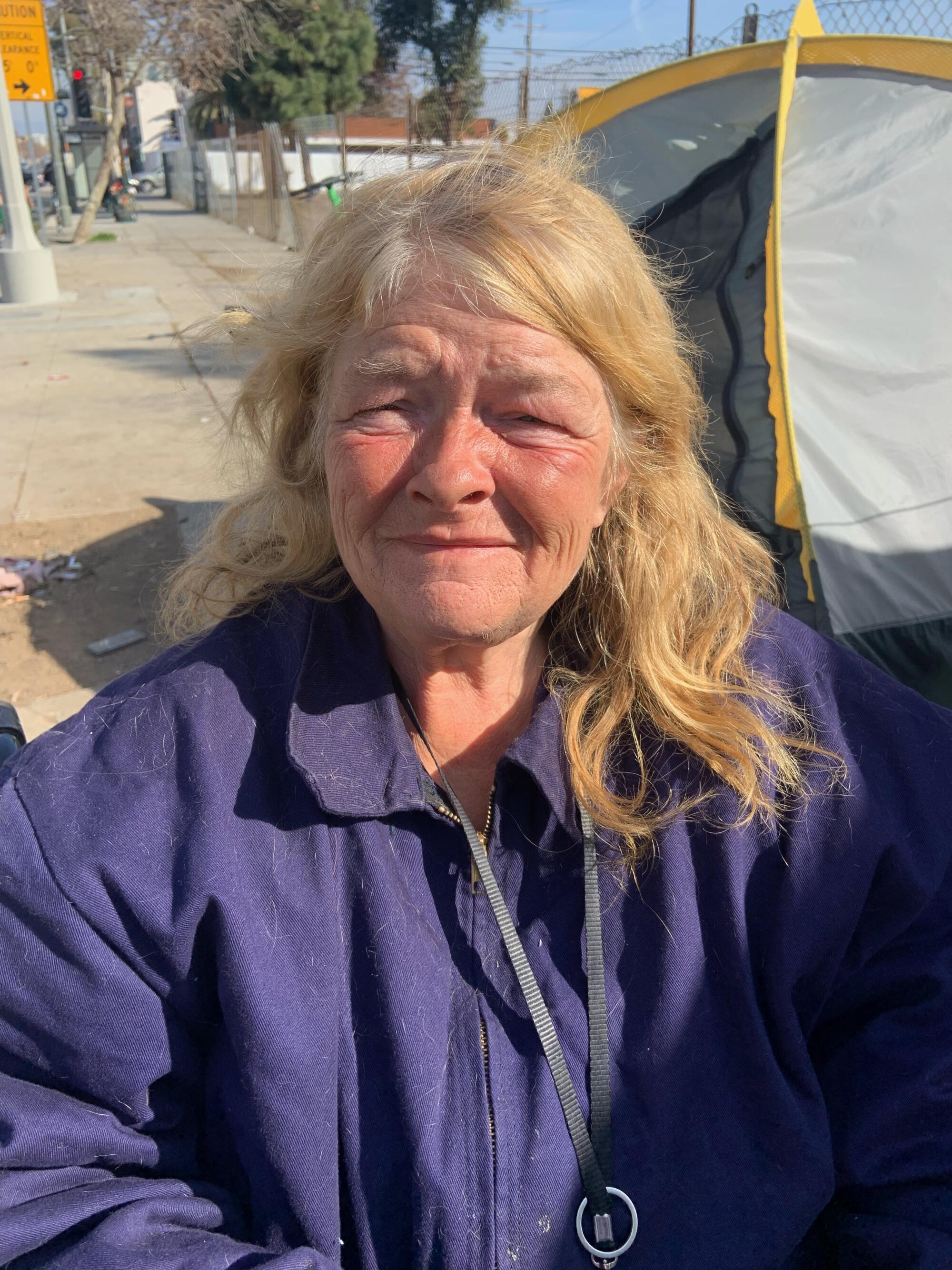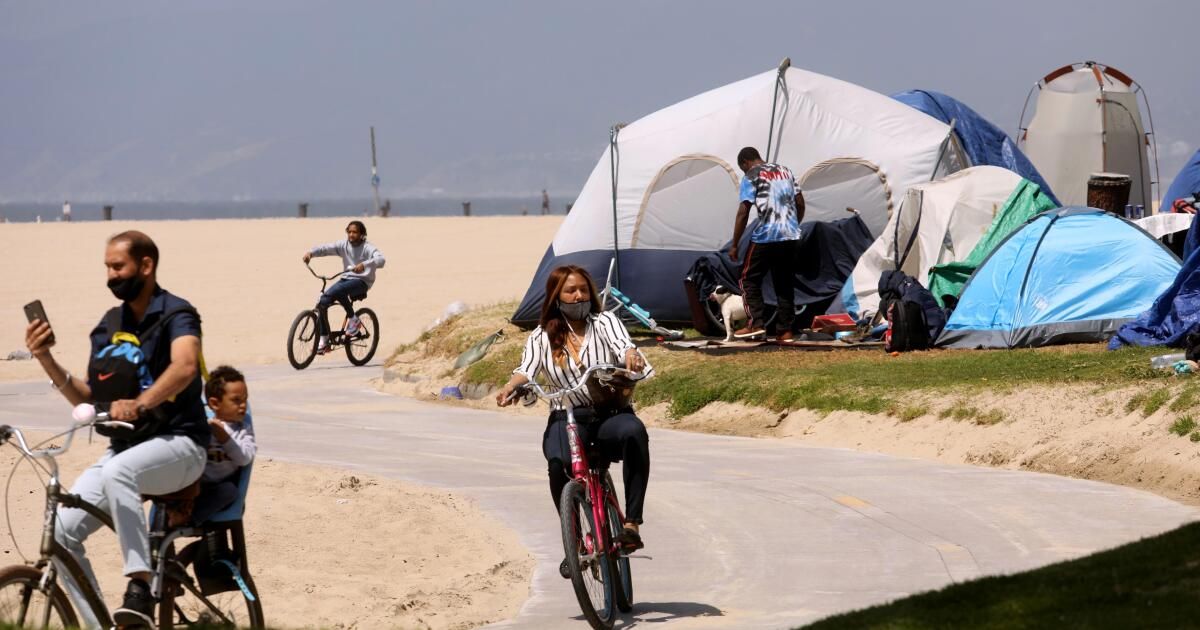How many times have you heard successful people talk about the obstacles they overcame, the discouraging chapters they endured, the “rock bottom” they rose from? Maybe you see your own life in similar terms. It's a particular narrative that ends successfully, and anyone who has lived it would tend to think that other people's lives can, with work, fit this arc. We need to move away from that assumption. Some people's lives are not on an upward trajectory and may never be, and those people deserve respect and dignity too.
Earlier this month I met with three of my homeless neighbors in Venice, one who has been on and off the streets for 20 years, another who has autism, and another whose life was turned upside down by a toxic relationship. They agreed to share their stories with The Times on the condition that their last names not be used.
Governments and nonprofits invest untold sums into caring for the homeless through countless programs, but in speaking with homeless people, I often hear that their needs are not very complex. Even a modest monthly check would be life-changing for many. What if a big part of the solution to homelessness was simply a universal basic income? —Robert Karron
Brandon
My name is Brandon and I am 37 years old. I grew up in Lancaster, in the Antelope Valley. I was 9 and a half weeks premature – I only weighed a little over 3 pounds. I've made up for it since then. But in my first year of life I had many seizures.
“I didn't understand why I had this feeling of dissatisfaction,” Brandon said of one of the first jobs he had. “My father looked satisfied after a day of work. why I did not do it? He wanted to achieve it but he didn't know how.”
(Courtesy of Robert Karron)
I graduated high school early, when I was 15 years old. I studied independently, because school was getting stranger and stranger. There was violence and gang activity. Children were expelled from Los Angeles County and then transferred to ours, in Kern County. I remember one kid shooting another kid dead in eighth grade. They knew each other from Los Angeles and since then they had problems. It happened in front of my math teacher's house. For years, you could see bullet holes in the wall. That boy was tried as an adult and received two life sentences. It's like school is a training ground for prison.
It was also a racial political zone. I celebrate Hanukkah and there was a group of children who chose to insult me. I put myself out there and told the people who celebrated it, that they didn't have to do that. But I didn't realize that it was going to be something that would be detrimental to my social well-being.
So I took classes at home. It was good because I could go at my own pace, but it was bad because I became too familiar with my parents; We could have used more distance. I didn't get along with my mom and we clashed.
After high school, I thought about going to the Marine Corps (my grandfather was a decorated war hero) and they accepted me into the deferred entry program, but they found marijuana on my drug test, so it didn't work out. I was exposed to drugs early; it was widespread in my high school. They pressured you to accept them because the children they sold depended on it for their livelihood; In their families, they were the ones who earned. It seemed glamorous then, but now I don't see any glamor in it.
I only use these blankets. It's not enough, but people steal so often that it's hard to keep things.
-Brandon
I started working at an insurance company and worked for seven years. I was also taking college classes at Antelope Valley College, music classes, my passion. I didn't think of musical practice as “practice,” because when you get so much pleasure from something, “practice” isn't in your mindset. But when the money started coming in, I let it go.
He had many jobs within the company, but primarily he was a patient service associate. When I was 17, I had my own apartment; My parents helped me furnish it, very kind of them, but I wasn't prepared for that kind of responsibility. Although he was making money, it was a miserable existence. It was a dark period for me. I still felt empty at the end of each day. I didn't understand why I had this feeling of dissatisfaction. My father looked satisfied after a day of work. why I did not do it? He wanted to achieve it but didn't know how.
At 18 I fell in love with a woman 22 years older than me. I was with her for seven years. She was an incredible artist. I finally quit my job and worked as a butler for her friends. When I left her, I sought therapy because she had lost control of society. I tried to get into music then, but there weren't many opportunities.
I have been on and off the streets for 20 years. I only use these blankets. It's not enough, but people steal so often that it's hard to keep things. I would like to have my own space, but I'm not sure how. I'm putting one foot in front of the other. It's hard because I have a stomach virus and all these wounds on my leg and hand that never heal. They are in a constant state of infection.
garrick
My name is Garrick and I am 56 years old. I've been in Los Angeles for nine months. Before that I was in New York City for 11 years (128 months). I'm planning to move again in 39 days, on Tuesday, February 20, and I need to find a place where I can spend the day before, from 8 a.m. to 8 p.m., getting ready. I don't know where that will happen. Do you have any idea? Is there a gym in Los Angeles that has military cots and a large bathroom with showers, sinks and toilets where you can come and go as you please, as long as you sign your name? I ask because I have never heard of something like this.

“What I would like to have after my bus ride is a CD player,” Garrick said of his plan to move to Boston. “Then I need a CD with every song Led Zeppelin ever sang.”
(Courtesy of Robert Karron)
I'm moving to Boston, but I need someone's smart device to check Greyhound for the bus that makes stops in Phoenix, El Paso, Dallas, Atlanta, Washington, DC, and three stops in South Carolina: Anderson, Greenville, and Spartanburg. Then I need to see what time the bus arrives in Boston. If I know the time, I can plan my first day.
I'm moving because Boston has everything I need. In Los Angeles I'm lying on the sidewalk with chiggers. It's better than New York by a wide margin, but in Boston I'll have better prospects because I know the neighborhoods, the resources, the trains, and the shopping centers. I lived there for four months, before moving to New York. Meanwhile I was in Providence, two days and two nights.
There are a lot of variables when you come from a broken home, you have high-functioning autism and your stepfather was drafted into the Vietnam War and was an authority figure who moved you and your mother to Ohio.
My mother and I identify with each other and idolize each other. We could always fix things, if it were just the two of us. But that went down the drain when my mother let people stop things between us, when they said one sentence to her. When she was manipulated, things went in different directions.
Jobs? If you have high-functioning autism, you can't hold a job.
-Garrick
I like heavy music, specifically the songs from the summer and fall of 1972 and the winter, spring, summer and fall of 1973. The best example of that is the music of Led Zeppelin, by far my favorite singing group. What I would like to have after my bus ride is a CD player without headphones (those always make the player break down) that runs on batteries. I can pay for the batteries. Then I need a CD with all the songs that Led Zeppelin sang.
Jobs? If you have high-functioning autism, you can't hold a job.
I have three main places to sleep. One of them is here. Last night it dropped to 46 and 47 degrees. To keep warm I use bedding that I hide behind those bushes.
cintia
My name is Cynthia and I am 59 years old. I was born in Ohio but grew up in Wisconsin. I finished high school, but at 15 I left school because I got pregnant. The father was a family friend in his 20s who my mother had asked to take care of us when she took classes to become a certified nursing assistant. He ended things when she found out she was pregnant.

“I took the bus to Union Station in Pasadena, where they help you find a place,” Cynthia said. “But soon he was on the street.”
(Courtesy of Robert Karron)
At 17 I had depression problems and the state took my daughter away. Now it would be illegal: They threatened to cut off my mother's welfare checks if she didn't sign her papers. I got pregnant again at 21 and I have a son who loves me to death; He is now in Kentucky with his father, my ex-fiancé. We were going to get married, but he wanted me to live at his mother's house for a year; I said no and went back to live with my mother. She came to get the engagement rings. That made me angry, so I threw them into the front yard. He searched for two hours but finally found them.
I went back to school and got my GED. I was taking college business courses, but the man she was married to at the time couldn't hold down a job, so I quit and started working at a company that shipped packages of cheese and candy.
I later got engaged to someone who moved me to Minneapolis, where I worked at a Greek restaurant. When I found him in bed with another man, I had to find another place to stay. The owner of the restaurant, who liked me, was going to host me, but his wife became jealous. Then I had to return home again.
I met my boyfriend Greg. We started talking and at night he was already curled up next to me.
—Cintia
When I lived at home, I began a 10-year relationship with someone I saw several times a year. She said she was in the military and was always traveling. After 10 years I was 53 and he asked me to move with him to Los Angeles. I've been on the bus for two hours when I call him. He says that he is in trouble and needs 500 dollars. I say I don't have it. He says, get it however you can. When I couldn't get it, he stopped taking my calls. I took the bus to Union Station in Pasadena, where they help you find a spot, but soon I was on the street.
I was protected by a great guy named Tennessee (he was from Tennessee) and two weeks later I met my boyfriend, Greg. We started talking and at night he was already curled up next to me. Tennessee gave him a blanket, but at midnight I told him to leave: he was going too fast. But everything went well. We've been together five and a half years and we're getting married after we move in together.
Robert Karron teaches English at Santa Monica College.












